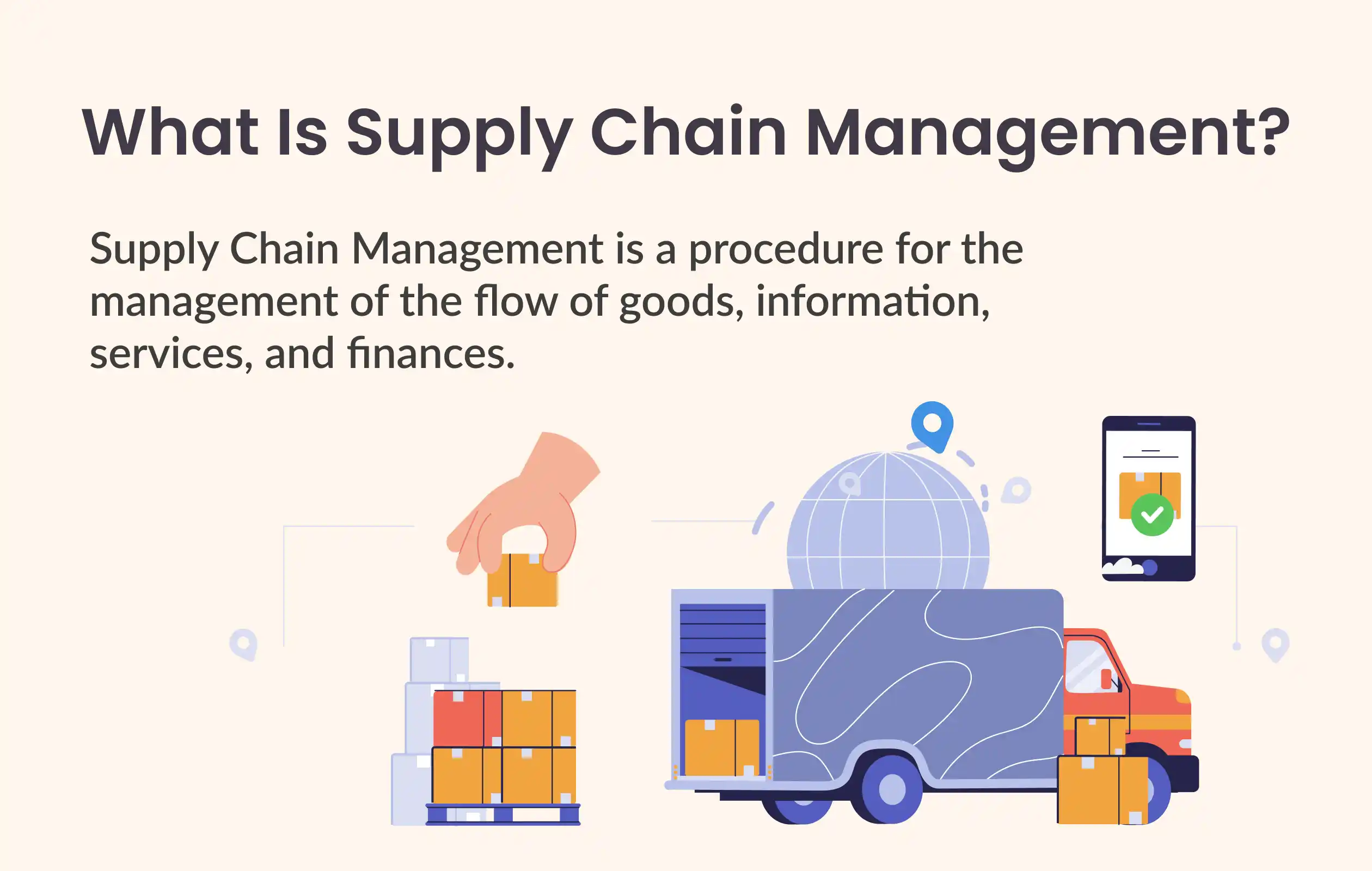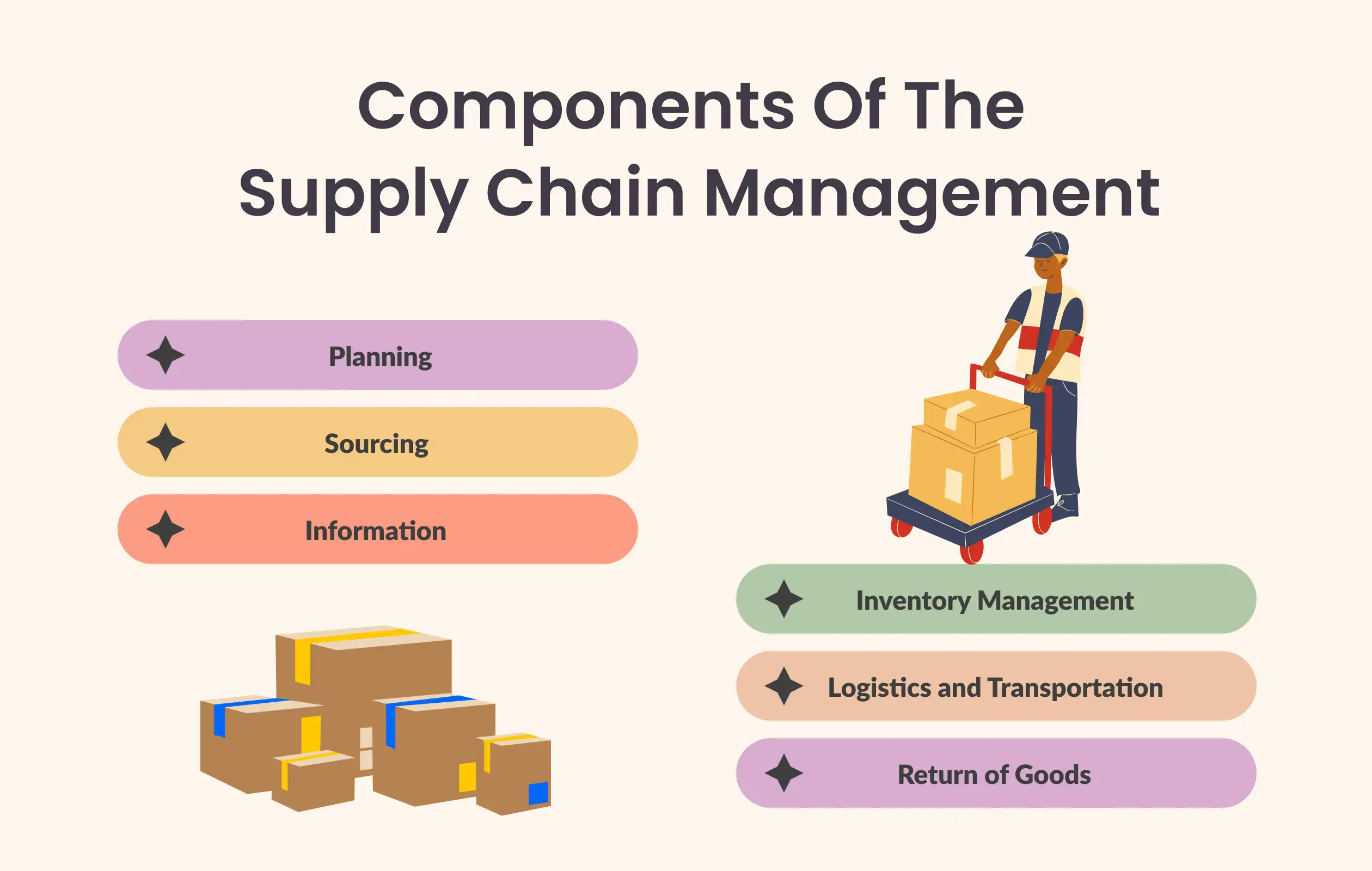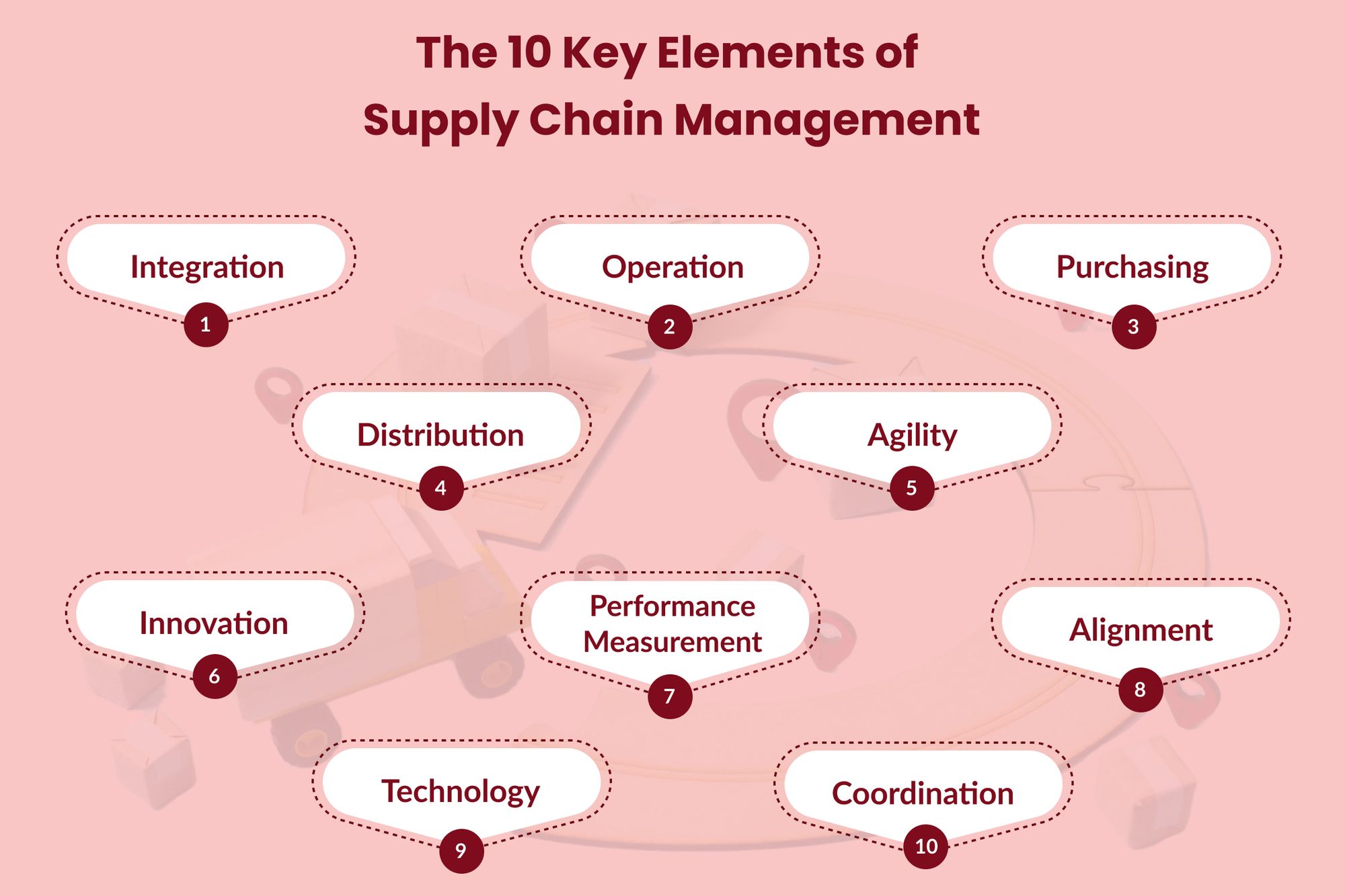Top 10 Key Elements of Effective Supply Chain Management (SCM)

In this growing world where changes are essential, supply chain management is essential for growth. Business growth majorly depends upon the production of services and goods. Supply chain management is a step by step system where many components collaborate at each stage to get the final product/result. For a beginner who is new to the dynamic world of supply chain management, getting into it becomes easy if the prerequisites are cleared.
To gain a sustainable competitive advantage in this competitive world, various elements contribute to the output. Supply chain management is a holistic approach or an ecosystem that plays a crucial role in various major activities in the entire production. In this article, we will be understanding the meaning of supply chain management and its key elements that contributed to making the business successful.
What is Supply Chain Management?

Supply Chain Management is a procedure for the management of the flow of goods, information, services, and finances. The complete procedure is from the movement of suppliers to the manufacturer, retailer, wholesaler, and to the end customer. The main goal behind the introduction of supply chain management is to make sure that the products are delivered to the right place at the right time by maintaining costs and efficiency.
thouCentric offers artificial intelligence tools like thouSense and thouPlan which help in predicting demand and developing a successful supply chain management system.
Some components of the supply chain management are mentioned below:

These key points contribute in forming a successful supply chain management system.
10 Elements of Supply Chain Management
An effective system should be agile and functional which leads to strategic decision-making and cost reduction in operations. Moreover, supply chain management tends to work with maximum efficiency and scale up to the capabilities that provide credibility in the operations.
Here are 10 elements that play a major role in the supply chain management system:

1. Integration: Before starting a business, a proper methodology and meaning of the business should be cleared. For the better functioning of the operations, strategic planning is a mandatory prerequisite. In this data-driven world, integration of supply chain management is an essential process to reduce the chances of errors. Organizations must make proper divisions in suppliers, third-party logistics, co-manufacturers, and more. It provides complete transparency to plan and execute the operations.
2. Operation: Operations is one of the crucial elements in supply chain management. Operations lead to the efficient workflow of the supply chain. It results in powerful insights with the contribution of real-time data. It can be useful in creating sustained improved paths that help in evaluating the day-to-day operations. It also helps the business owners to make cost-effective decisions. Moreover, the entire streamlined process helps in anticipating the requirements. It is a must to optimize all the elements of storage and distribution to enhance the customer experience.
3. Purchasing: Purchasing is an effective supply chain management element. It plays a major role in selecting the raw materials, craftsmen, and other required components. It also determines the necessity of the goods that need to be purchased. Sourcing of the products is also one of the major elements in the entire supply chain management system.
Moreover, demand forecasting also increases the efficiency and profitability of supply chain management. An effective system facilitates planning and prediction that can lower the costs of production.
4. Distribution: After the complete development of the product, supply chain management ensures that the products are delivered to the right person, at the right place, and at the right time. It manages the transport, delivery, and return of goods by getting insights into the operation. Moreover, for enhancing the distribution process, service capabilities and customer retention need to be improved. It also determines the profits by focusing on the profitability of the company. So, the role of logistics in the whole process is crucial for optimizing the processes by integrating different strategies for better client service.
5. Agility: The core element of supply chain management is agile. It helps in determining the company’s ability to adapt to the changes. Supply chain enables companies to compete with the market unpredictably. Flexibility is crucial in this competitive world of supply chain management. Identification of the medium for the long term supply chain helps in predicting the future with more efficiency. The agile supply chain is a must for creating a customer-centric business.
6. Innovation: Innovation on the other hand holds much value. An innovative idea helps in developing the product to balance out the flow and cost of the operation. It is the key element that leads to an optimally functioning supply chain management system. It is imperative in planning the integration of the management system with the conceptual stages. Businesses use new-age technologies in the management of transportation and logistics. However, there are some disadvantages associated with it also as it can greatly affect the business by resolving both structural and organizational complexities. Therefore the supply chain can improve decision-making transparency also.
7. Performance Measurement: A major element in supply chain management is the performance metrics. Analyzing the metrics based on the procedures can enable responsiveness and innovation in the organization. Supply chain management ensures an understanding of the business operations and KPIs that should be established. Establishing a measuring system is important for the framework.
8. Alignment: SCM needs to be strategically aligned with the company's objective. The fundamental cornerstone leads to transforming the entire supply chain management system. The role of Artificial intelligence in business can also help in providing the insights of supply chain analytics as extensive analysis can lead to informed decision-making. It also fosters the success of internal and external supply chain integration in efficiency.
9. Technology: The introduction of artificial intelligence in the supply chain can expedite supply chain planning most efficiently. Artificial intelligence, IOT, and Blockchain can also be introduced into the system to transform the business process that can help in automation. It can also lead to the creation of the latest software with the newest technologies to unlock new opportunities. The future of SCM largely depends upon advanced technology.
10. Coordination: The last key element that holds much value in the system. A well-planned and coordinated project helps in maintaining a good market image with business stakeholders. It also facilitates information sharing and allows companies to make better decisions. It consists of all the activities starting from scratch to the final delivery. It is also considered the building block of the success of the organization.
Conclusion
After going through the entire article, we can conclude that supply chain management requires proper planning and execution with a future vision. These key elements exactly sum up the requirement that gives a better understanding to meet the client's needs. Also, in this competitive world, effective implementation forecasting and distribution can lead to sustained growth in the supply chain process.
FAQ
Q 1. What are the Elements of Supply Chain Management?
The elements of supply chain management include:
Integration, Operation, Purchasing, Distribution, Agility, Innovation, Performance Measurement, Alignment, Technology, Coordination. These components ensure a seamless and efficient supply chain process, optimizing resource use and customer satisfaction.
Q 2. What are the Features of Supply Chain Management?
Key features of supply chain management are efficiency, visibility, flexibility, collaboration, and customer-centricity. These ensure streamlined processes, real-time tracking, adaptability, strong partnerships, and focus on customer needs.
Q 3. What are the 4 C's of SCM?
The 4 C's are collaboration, coordination, communication, and control. These SCM elements ensure effective partnerships, smooth operations, clear information exchange, and efficient management.
Q 4. What are the 5 Components of Supply Chain Management?
The five components of supply chain management are:
1. Planning and Analysis- Developing strategies to meet customer demands efficiently.
2. Sourcing (Procurement) - Selecting suppliers to provide goods and services needed for production.
3. Manufacturing and Production (Operations) - Converting raw materials into finished products.
4. Distribution (Transportation, Warehousing, & Logistics) - Ensuring products reach customers timely and effectively.
5. Returning (Reverse Logistics) - Handling customer returns and managing reverse logistics for defective or excess products.
Q 5. What are the 5 Elements of Logistics?
The elements of logistics and supply chain management are storage, inventory, transportation, information, and control. These ensure effective warehousing, stock management, product movement, data management, and logistics supervision.
Q 6. What is the Concept of Supply Chain Management?
Supply Chain Management involves managing the flow of goods, information, and finances from suppliers to consumers, ensuring efficiency, cost-effectiveness, and customer satisfaction.
Q 7. What are the 7 C's of Supply Chain Management?
The 7 C's of supply chain management are customer, cost, convenience, communication, coordination, collaboration, and continuous improvement. They focus on customer needs, cost management, ease of use, clear communication, harmonized activities, partnerships, and process enhancement.
Q 8. What are the keys to Effective Supply Chain Management?
Effective supply chain management relies on integration, agility, innovation, performance measurement, and alignment. These ensure coordinated activities, adaptability, technological advancements, performance tracking, and unified goals.
Q 9. What are the other elements of SCM beyond logistics?
Beyond logistics, supply chain management includes:
1. Demand Management - Anticipating customer needs to align production.
2. Inventory Management - Optimizing stock levels to balance supply with demand.
3. Supplier Relationship Management - Building strong partnerships with suppliers for consistency and quality.
4. Risk Management - Identifying and mitigating potential disruptions in the supply chain.
5. Sustainability - Incorporating eco-friendly practices across the supply chain to reduce environmental impact.
Each element enhances resilience and efficiency in the overall supply chain.